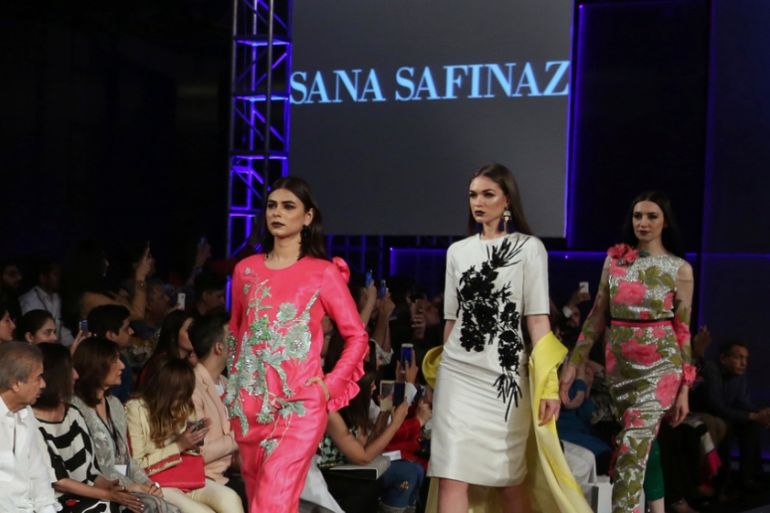Pakistani fashion brand Sana Safinaz criticised for ad campaign
The popular brand apologised for the campaign featuring Sana Safinaz models and members of Kenya’s Maasai tribe.

The popular Pakistani fashion brand Sana Safinaz is facing heavy criticism at home, after a photoshoot abroad.
The brand launched its summer collection on March 10, featuring Sana Safinaz models posing with members of the Maasai tribe in Kenya.
Keep reading
list of 4 items‘Feel less and less like playing’: Vinicius Jr in tears over racist abuse
‘Rendered invisible’: A wave of anti-Arab violence tests US hate crime laws
Germany bans far-right Austrian nationalist Martin Sellner from entry
Critics say the brand used the tribesmen as props instead of having the models interact with them in a genuine way.
Many took offence to photos showing Maasai men holding umbrellas for the models.
“As a potential customer who does purchase Pakistani clothes online, when I see that, I see that the native man is of a lesser value than the model,” Sosun Mubbashar, a rights activist, told Al Jazeera.
“There should be no need to exploit the people and culture of the land,” Mubbashar added.
I am sorry am I missing something here with this campaign? Sanasafinaz using these people as an ornament to selling their over priced lawn?? Mind blown at why they would deem this acceptable to the slightest. #disturbingAF pic.twitter.com/rVcWyXJfnF
— S H A H (@ShahTalks) March 7, 2018
The brand’s Instagram page was flooded with criticism, but many, like Mubbashar said their comments were deleted from the post.
Twitter user sosun said: “Sana Safinaz deleted the comments I left under their posts on Instagram .. this is y’all fav brand? Can’t relate.”
sana safinaz deleted the comments I left under their posts on instagram… this is yall fav brand? can't relate https://t.co/PgXR1n2j6k
— sosun (@soandsun) March 9, 2018
Apology
Safinaz Munir, one of the founders of Sana Safinaz, said the backlash against the brand was unwarranted.
“First of all, you’ll notice that many of the negative comments on Instagram and Twitter are coming from paid accounts, from fake accounts,” Munir told Al Jazeera.
“And even with that, if you look at the response we’ve gotten, you’ll see that of 400 comments, 300 of them are positive. People are loving this campaign,” she said.
Following the criticism, the brand removed the offending photos from its social media platforms and posted an apology and explanation about its intentions.
“Two years ago we read an article on the internet that talked about ethical tourism,” the statement read. “It describes the plight of African tribes that were being exploited,” it said.
“The article went on to say that avenues promoting responsible tourism exist that encourage and support local projects,” it added.
“We do apologise deeply for any offence we have caused despite this never being our intention.”
The brand maintains that it employed the Maasai people photographed for the campaign.
‘Wider conversation needed’
The apology itself prompted criticism from several, including feminist sociologist Nida Kirmani who said the apology “replaces one colonial fantasy, of going to Africa and discovering this exotic place and exotic people, with this other colonial fantasy, of a white saviour complex.”
Salima Feerasta, editor of karachista.com, said it is not just the brand that is guilty of such elitism.
“I think it’s time to have a wider conversation about how designer collections are sold in Pakistan,” Feerasta told Al Jazeera.
“It’s an aspirational product, and as such, it’s positioned in such a way that campaigns routinely show models in exotic locations, enjoying the trappings of luxury.”
The brands Elan, Saira Rizwan, and Farah Talib Aziz have all been criticised for campaigns. Feerasta said this is a trend that needs to change from within the industry.
“Designers have a responsibility,” she said. “They have a customer base of millions, and subtly they can change the way people see the world,” she added.
“With these campaigns, they can reinforce stereotypes, or they can break them. So maybe it’s time to talk about how they use that power.”